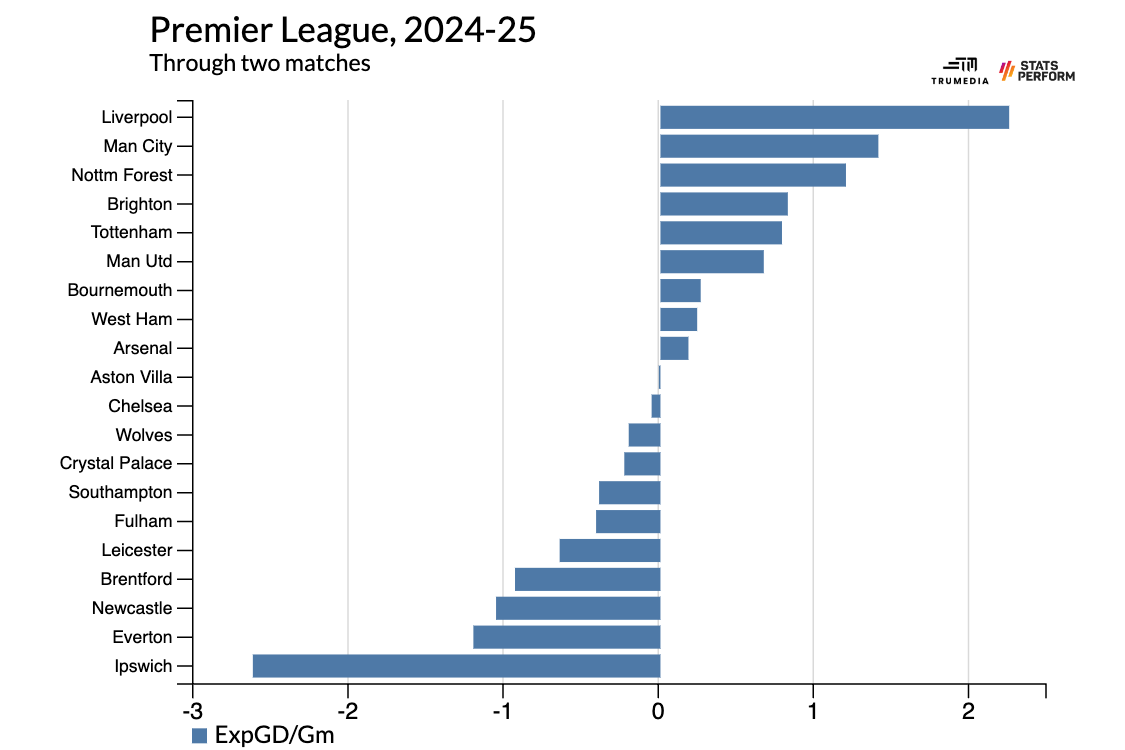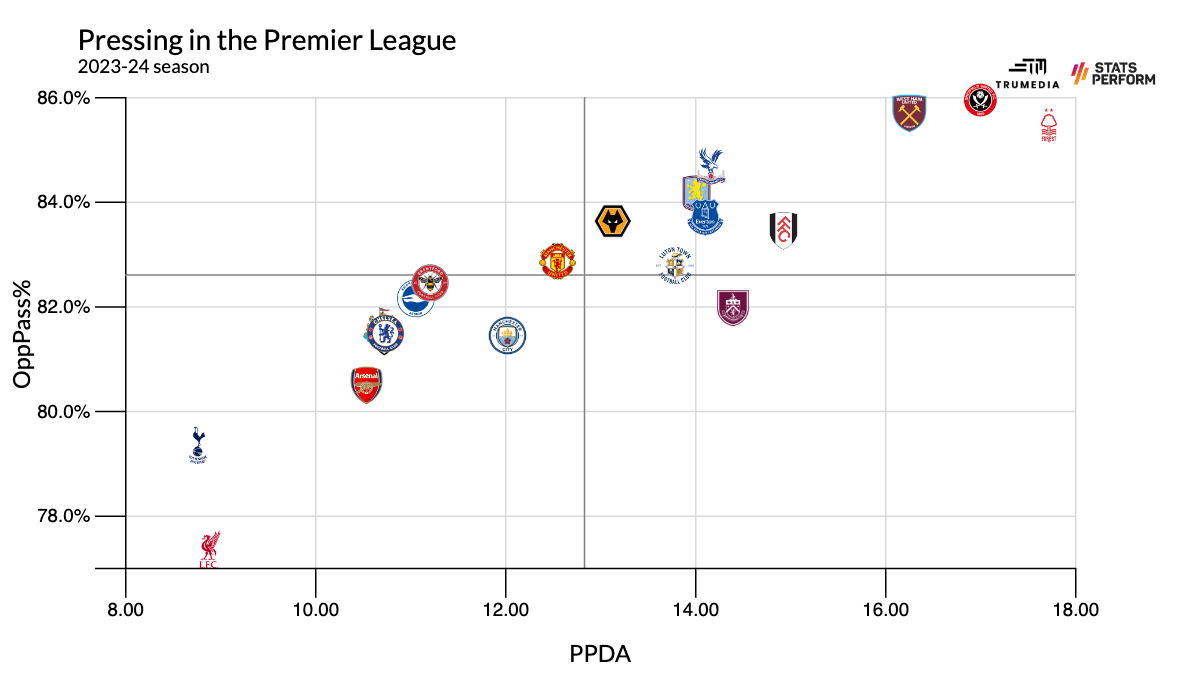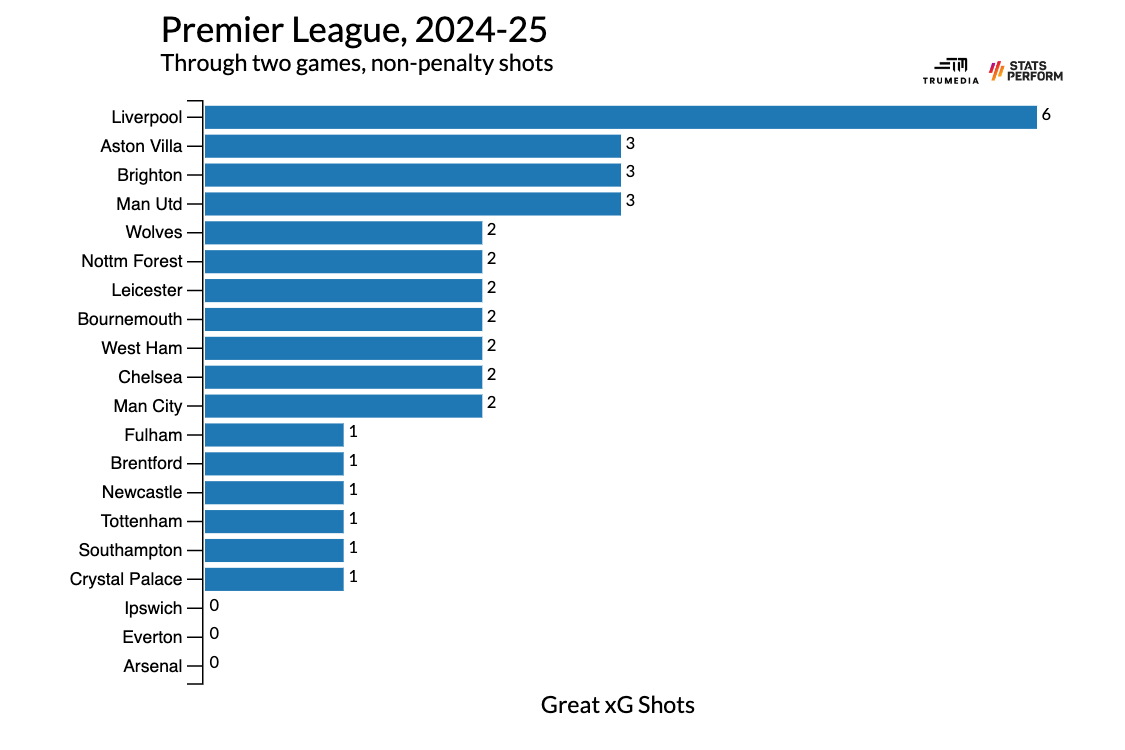If you watched the Liverpool vs. Brentford game on Sunday, you experienced something quite weird: silence.
During the Jurgen Klopp era, Anfield was almost never quiet. Not only because they almost never lost, but mainly because things were always happening. Liverpool were always either pinning their opponents in the attacking third, attempting daring passes over the opposition backline, or fending off an opposition counter-attack.
Last season, Liverpool's matches averaged 94 possessions per team -- the third-highest mark in the Premier League. They took constant risks with the ball and then forced their opponents into doing the same by immediately pressuring the ball as soon as they lost it. Klopp wanted chaos, and the fans fed off the team, who fed off the fans, who fed off the team, and on and on.
But at some point in the second half against Brentford, with Liverpool leading 1-0, the fans didn't seem to know what to do. It's easy to know when to cheer when Trent Alexander-Arnold is bombing a cross-field ball to Darwin Núñez, but what noises do you make when you're watching all of the same players from a year ago patiently pass the ball around? When do you scream? How lightly should you clap?
On Sunday, Liverpool completed 92% of their passes -- their highest rate on record in a Premier League game. And they comfortably dispatched Brentford, 2-0, in a game featuring just 85 possessions per team.
So, I make that two things Arne Slot has done that Klopp couldn't: he's the only Liverpool manager to win his first two Premier League games in charge.
Over just two matches, we can't draw too many conclusions about anything, from team quality to their tactical approach. What's random, what's purposeful, what's the result of the opponent, what's caused by what players are fit -- we can't really know. But it doesn't seem like a coincidence that Liverpool broke that passing mark and confused their fanbase in only the new manager's second game in charge.
What's changed for Liverpool under Arne Slot?
Well, now they're clearly the best team in the league. Here's how everyone stacks up, measured by expected-goal differential, though two matches:
 (Source: TruMedia / Stats Perform)
(Source: TruMedia / Stats Perform)
I kid, of course. There's not much to take from any of this. Ipswich played Liverpool and Manchester City. Newcastle and Everton both suffered red cards. Chelsea's presence in the middle of the chart shows that the 6-2 win over Wolves was more about efficient finishing than any kind of improved underlying creation and suppression of chances, while Liverpool's presence at the top mainly tells you that they've had an easy schedule thus far.
But it also tells you that they've done just about as well as anyone could've expected in Slot's first two matches. So, how have they done it?
From a personnel perspective, there are only two notable changes from last year. Diogo Jota is starting in the center forward spot, rather than Darwin Nunez, and Ryan Gravenberch is the third midfielder instead of Curtis Jones, Wataru Endo or even Harvey Elliott.
Those two decisions speak to the larger shift in play-style we've seen from Slot's first two matches. Across his Liverpool career, Diogo Jota has completed 73% of his passes. That's not particularly notable in a vacuum; it's about what you'd expect from a center forward for a top team. But it's still a decent uptick from Nunez's 69% rate last season. On top of that, Jota averaged 31 pass-attempts per game last year, while Nunez played just 22 passes.
Both of the Uruguayan's marks ranked last on the team last year; therefore, the preference of Jota, so far, is representative of a larger desire from Slot for Liverpool to have more of the ball.
In the same fixture against Brentford last season, Liverpool played 37% of their passes forward, compared to 31% on Sunday. They moved the ball upfield, on average, at a rate of 1.71 meters per second at home to Brentford last season; that dropped all the way down to 0.97 meters per second on Sunday.
However, the bigger changes -- to me, anyway -- have come on the other side of the ball. Liverpool are still pressing, but it's not the aggro, all-out gegenpress we saw under Klopp. These numbers in particular can change significantly as soon as you add another game into the sample, but Liverpool have allowed their opponents to complete 80.3% of their passes so far this season, and they've allowed 10.7 passes per defensive action (PPDA).
Those are both better-than-average numbers across the league, but they're well below Liverpool's rates from last season.
 (Source: TruMedia / Stats Perform)
(Source: TruMedia / Stats Perform)
Add in the fact that Liverpool played one mid-table side at home and then opened the season away at Ipswich Town, one of the favorites for relegation, and these are two matches where you'd expect Liverpool's pressing to be higher than their season-long rates. The "Heavy Metal Football" of Klopp isn't quite dead yet, but someone's definitely turned the volume down.
Could this actually make Liverpool better?
The biggest single indicator of real improvement so far -- the thing that's been most notable from the first two matches -- is the team's performance against counter-attacks.
Without so many turnovers and without the risks from the high press, Liverpool simply just haven't given their opponents many opportunities to get up a head of steam. Last season, Liverpool's opponents moved the ball upfield at a rate of 1.55 meters/second -- the fastest pace in the Premier League. Through two games this season, that number is down to 1.27, which is right around league average.
And then, when their opponents do break through the first line of defense, it seems like this is when Slot wants his players to exert the most energy. As opposed to chasing the ball as aggressively in the final third, Liverpool's midfielders in particular have been killing themselves to make recovery runs to get back behind the ball and slow the opposition down. This is where the shift towards Gravenberch fits in; his recovery speed is so much higher than any of the other midfielders who could be starting. Two games in, there does feel like there's a little more organization after the press gets broken, and there's certainly a bit more solidity.
Under Klopp, the Liverpool experience was almost a test of how much variance you could handle: We're going to create six huge chances every game, but we're also going to concede two huge chances every game, and that's going to go our way -- most of the time. So far under Slot, they've eliminated that second part. Every team in the league has conceded at least two opposition chances worth 0.15 xG or more, except for Liverpool. They haven't allowed a single one. The average xG of the non-penalty shots they conceded last season was 0.11; this season it's all the way down at 0.05.
On the other side, Liverpool have created six of what we'll call "great" shots, ones worth at least 0.33 xG. That's twice as many as any other team in the league:
 (Source: TruMedia / Stats Perform)
(Source: TruMedia / Stats Perform)
If they can keep this up -- preventing turnovers, never conceding high quality chances, and creating a ton of great opportunities for themselves -- then, well, they're going to finish the season as one of the greatest teams European soccer has ever seen. That said, through two matches against unspectacular opposition, there has been some minor movement in the betting markets for Liverpool away from the chasing pack for fourth, toward the other top two in the title race. That suggests we've learned something positive about Slot's Liverpool.
There's still a long way to go, of course. The patient possession is likely to lead to some frustrating performances. The team hasn't exactly been lights out in either of their first halves so far this season. There's questionable depth at the center-back position after Virgil van Dijk, Ibrahima Konaté and Jarell Quansah. The team's pursuit of Real Sociedad's Martín Zubimendi earlier this summer -- after similar efforts for Moisés Caicedo and Aurelien Tchouaméni in the previous two summers -- suggests the club thinks the defensive-midfield role is in need of an upgrade. And then, of course, shouldn't we expect some kind of decline after the departure of one of the greatest managers of all time?
We should, but at the very least, the first two matches of this season have provided a sketched outline of how this all might work out, too. While a tamped down press and a less-vertical approach in possession improves the defense, the attack could still perform at an elite level because these players are still capable of executing the faster-pace, open-field patterns they developed under Klopp. Plus, the three midfield signings from last season have all had a year to adjust to the team, and both Szoboszlai and Gravenberch are at ages (23 and 22 respectively) when we should expect them to get better. And then, perhaps, Slot's more controlled approach on the pitch and on the training ground will help the club avoid the injury crises that seemed to occur every other year under Klopp.
Anything can happen over two games, and Liverpool's match with Manchester United at Old Trafford on Sunday should be more instructive about the team's current level than either of the fixtures against Ipswich Town or Brentford. A lot can, and will, change from now until not only the end of the season, but the end of September.
That said, with everyone healthy and a new manager on the sideline, Liverpool have shown us what the club's next era of success might end up looking like -- and what it might sound like, too.
